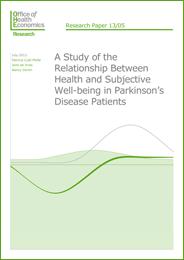Sign up to our newsletter Subscribe
Analysing Global Immunisation Expenditure

Significantly increases of wealth and health in the Western world over the past 50 years do not appear to have produced an equivalent increase in societal happiness, at least not using traditional measures. As a result, policy makers now are looking more closely…
Significantly increases of wealth and health in the Western world over the past 50 years do not appear to have produced an equivalent increase in societal happiness, at least not using traditional measures. As a result, policy makers now are looking more closely at alternative ways of measuring the welfare of society, including measures of subjective well-being.
In the context of health, interest has grown in understanding both how current measures of health-related quality of life relate to subjective well-being and whether subjective well-being might provide a sound basis for health care resource allocation decisions in the future. This study uses Parkinson’s disease as a case study in assessing the fit between measures of health and subjective well-being. The findings suggest that some current measures, particularly the EQ-VAS and some dimensions of the EQ-5D, may be useful in predicting subjective well-being. The authors conclude, however, that further empirical research on measures and in other diseases is necessary.
A revised version of this paper has been published in Value in Health and can be downloaded from: http://www.sciencedirect.com/science/article/pii/S1098301514000539
Please cite as: Cubí-Mollá, P., De Vries, J. and Devlin, N., 2014. A study of the relationship between health and subjective well-being in Parkinson’s disease patients. Value in Health, 17(4), pp.372-379.
A Study of the Relationship Between Health and Subjective Well-being in Parkinson’s Disease Patients
Cubi-Molla, P., de Vries, J and Devlin, N.
(2013) A Study of the Relationship Between Health and Subjective Well-being in Parkinson’s Disease Patients. OHE Grant-Funded Research. Available from https://www.ohe.org/publications/study-relationship-between-health-and-subjective-well-being-parkinsons-disease-patients/